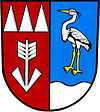Třemešná
| Třemešná | |||
|---|---|---|---|
| Municipality and village | |||
| |||
| Country |
| ||
| Region | Moravian-Silesian Region | ||
| District | Bruntál District | ||
| Area | |||
| • Total | 8.08 sq mi (20.94 km2) | ||
| Elevation | 1,198 ft (365 m) | ||
| Population (2011) | |||
| • Total | 942 | ||
| • Density | 120/sq mi (45/km2) | ||
| Time zone | CET (UTC+1) | ||
| • Summer (DST) | CEST (UTC+2) | ||
Třemešná [German: Rowersdorf] is a village and municipality in Bruntál District in the Moravian-Silesian Region of the Czech Republic. Třemešná municipality lies in the southern part of the microregion in the deep valley of the Mušlov stream. The municipality was founded in 1245. Třemešná is the entrance gateway to the Osoblaha region, it is the starting point of the narrow-gauge railway and also the railway junction as tourists may change here travelling to Opava, Krnov or Jeseník. Currently it has a population o 934.
The dominant feature of the municipality is the parish Church of St. Sebestian built in 1730-1733 when in 1780 the church was enlarged with the church tower. The remains of an unknown saint that were brought here in the basket carried on the back from Rome by the hermit Severin are placed here.
The railway connection to Osoblaha was formerly planned to be the standard gauge railway with starting point in the town of Město Albrechtice and continue towards Slezské Rudoltice. To save costs the starting point of the railway was set to be in Třemešná and more importantly the narrow-gauge system (i.e. 760 mm) was used. Construction works of the Osoblaha narrow-gauge railway began in 1898 with the first train departed on the 14th of December the same year. The narrow-gauge train departs from the other side of the railway station than standard-gauge trains to Krnov-Jindřichov ve Slezsku. The route starts with the downhill gradient of 26‰ to a steel bridge in Třemešná. The route then ascends the highest gradient of 27‰ and shortly before Liptaň municipality follows the radius of only 75 metres. Just after the Koberno train stop the route enters the romantic, woody countryside of the river Osoblaha and around the ruins of Fulštejn castle continues to its final stop on the edge of Osoblaha just on the Czech-Polish border crossing. In 2003 the First Narrow-gauge Railway Association was created supporting the new narrow-gauge railway era. The association aims to support the tourism development in Osoblažsko region by the steam transport development on the narrow-gauge railway.
The Polish city of Glucholazy is accessible from Třemešná by train, the route to Jeseník runs just through this city and currently all the tourists are free to get off there and enjoy the historical spa city atmosphere with well-preserved historical city centre.
References
- This article incorporates information from the equivalent article on the Czech Wikipedia.
Coordinates: 50°12′00″N 17°34′15″E / 50.2°N 17.5708°E
| Wikimedia Commons has media related to Třemešná. |

